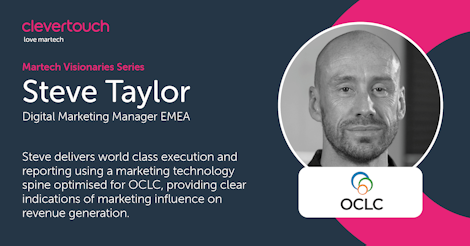Click the image above to read this interview in PDF format
What’s your role and please describe your career journey to date.
I joined Fujitsu 4 years ago as part of the Digital Workplace Services marketing team and then moved to lead Scenario Marketing which looks at Fujitsu solutions in the areas we want to go to market. We operate a structure with Field Marketing teams who know their specific regions in depth, with the HQ team providing the strategy and planning around campaigns, for those respective Field Marketers to execute.
How important is martech to your organisation and team?
From our perspective, martech gives us the information we need to make decisions. I think if done properly with clear goals and collaboration with other teams, martech is key to providing information to the questions:
- How did the customer find us?
- Was that organic or paid media?
- How is the website performing and how is Email performing?
- Which channels should we increase our investment in because they are driving better results?
All this constantly captured information allows us to optimise the campaigns and decide where to invest budget.
I also think it helps us build loyalty, because the adjustments we make to improve results drive a better customer experience, create better stories and makes our marketing, and our brand, more relevant to our customers. This all contributes to our success.
The fact that we can integrate platforms and systems allows us to look at customer data in a more holistic way. We have an end-to-end view of what’s working and what’s not working which allows us to make efficiencies in our processes, and how we streamline data, all geared towards creating a more satisfying customer experience.
Ultimately, it is to make Sales work faster and smarter.
Which technologies make up your martech spine?
From my perspective, Marketo and Salesforce are the key technologies which sit at the centre of our martech strategy and supports our Global Go-to-Market approach. There are others which are relevant, but these two are the most important.
Do you look to martech as a source of innovation or a necessary cost to doing business?
I think this is so important to consider. It can be both. What is significant is not to let martech become a burden or a tool which doesn’t add much value.
Depending on how your martech is driven, planned and setup from the beginning is going to steer you down one of those two routes. At Fujitsu we want martech to be a source of innovation, and I think we’re succeeding in doing that. It is easy to get lost in the data you are acquiring from all the tools, if they are not correctly connected. I’ve seen long lists of tools some companies have, and some of those tools we’ve looked at acquiring, but if you have 20 different tools, systems, platforms all creating data, and they aren’t in sync, where do you start your analysis?
Any extra tools you add to your system increases the training burden on your team. It will fragment the workload within the team, may create unintended silos and in the end, reduce the value your marketing team is bringing to the business.
Less can be more in this case. Improve what you have is a good first step to take. Be very structured, have someone who can look from above at your martech, make sure all tools are relevant and all working together. That is how is think we make martech a source of innovation and success.
A common mis-step companies make when buying martech is thinking they can save money up front by choosing 5 different technologies which appear to have a cost less than a single platform that does everything. It is rarely a saving. The time and cost it takes to deploy, link and optimise, then train on those 5 systems will often eliminate the saving made on the initial license purchase.
How have you developed your team?
In the last fiscal year we looked at our team, and reviewed exactly what they are asked to do and what the business needs them to do. Marketing teams have a broader and broader scope of responsibilities these days. We have to deliver results, and it is therefore we create a very results driven marketing environment.
We need a wide array of skills, and I think the most important thing, is the need to quickly adapt to change. This might mean change in customer challenges or pain points, it might mean changing martech.
To put ourselves in the best position, we reviewed what skills we had in the team, what each Marketer liked to do and identified any skills gaps. Then, in tandem with their personal development plan, we identified where we need to develop them.
In parallel, we looked at the martech roadmap. We need to ask if we are investing more in an existing or new tool, do we require specific training on them?
We have a very talented team that like and understand how to get the best from the technology and know its value.
Everyone knows it is the data generated what allows us to optimise both the customer experience and our campaigns. Training is part of the goals for our team, and we ensure we are supporting our staff to meet any requirements they have.
The team see the potential and the results that martech gives us, and our plan is to continue to develop them in every gap we identified to continue to grow the success of our martech setup.
How well is training embedded into your company culture?
While we have some reactionary training, we are applying an approach more commonly seen in project management or I.T. developers. We are implementing Agile/SCRUM methodologies into our marketing team with some adjustments; We won’t all be Scrum masters or Project leads! But we want to bring this way of working into our daily use.
We have virtual teams for projects that we’re calling Squads, where we bring together a broad array of skills onto a project and we all learn from each other and come up with better solutions. Automation sits at the centre of it all.
What does Martech success really look like?
Overall success is if the technology is impacting our results in a positive way. We are able to show positive marketing impact on decision making around revenue, due to the data we generate.
Technology itself doesn’t do anything. It’s when you set it up properly it allows you to interrogate results, take a dynamic approach to your marketing around customer behaviour and their preferences. To be at that stage you need a deep understanding on the value of the tools and how to show the results to the right people in the organisation.
What advice would you give others looking to deploy and advance their careers in martech?
The martech worker of the future needs to be passionate about results. Data driven and know that data is crucial to building the right strategy on customer acquisition and retention.
The market is a very busy space with lots of companies using the same channels to communicate to similar audience sets. A way to cut through and deliver a good customer experience is with exceptional use of the technology at your disposal. Knowing the technology is really important to anyone in martech, but the ability to understand how a collection of technologies interact together, and how to present the data from those technologies in a way the business understands is also key; maybe this is best described as business aligned data driven insights.
One area I think is especially important, in the age of GDPR, is the understanding of data privacy and data security. It gets more important every day but A.I. and machine learning which optimise, in real time, customer experience across different channels is a direction I see martech heading.
There’s no one solution that works for everyone and every business. You need to be able to match the needs of a business, your team and your maturity with martech together to bring value, not just focus on the technical aspect.



